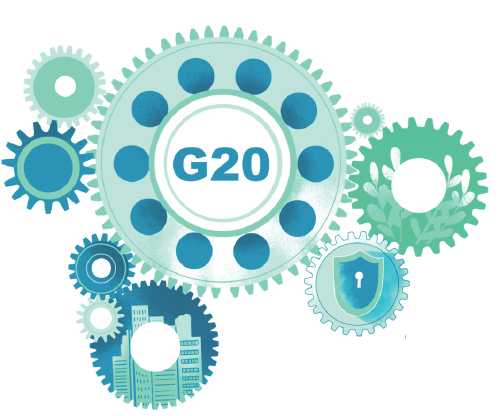Today, there's no going it alone


Pandemic has shown that in our interconnected times a country cannot cut itself from the rest of the world
The novel coronavirus pandemic that is spreading across the world is a great challenge to global public health security. As President Xi Jinping said during the Extraordinary G20 Leaders' Summit on the novel coronavirus on March 26, major infectious diseases are the enemy of all. He called for the world to be resolute in fighting an all-out global war against the pandemic and to make a collective response for prevention and treatment at the international level, as well as urging countries to support international organizations playing their roles and enhance their international macro-economic policy coordination. Four key words reflect China's approach to combating the virus.
The first of these is solidarity. The whole world, especially major countries and G20 members, should act with unity and collectively respond to the common threat. They must comprehensively step up their cooperation and foster synergy in their actions.
The novel coronavirus has spread worldwide to more than 200 countries and regions, infecting over 600,000 people globally. The escalating contagion has forced many countries to declare a state of emergency and scale up prevention measures. This is a global issue that requires the collective response of all countries in the world and no single country can cope with it on its own.
The second key word is responsibility. China has established an online open knowledge platform on the prevention and control of the novel coronavirus. Sharing with the rest of the world its own experience in fighting the virus demonstrates China's sense of responsibility for safeguarding global health security.
The Chinese government rapidly mobilized resources from across the country in response to the outbreak to safeguard people's health and safety. Upholding the principle of building a community with a shared future for humanity, China timely shared knowledge and information on the epidemic with other countries and actively carried out international cooperation. China has donated medical supplies and sent medical teams to aid in other countries' fight against the contagion.
The third key word is openness. As President Xi said, China will continue to advance reform and opening-up, widen market access, improve its business environment, and expand imports and outbound investment to help stabilize the world economy. He said China will increase its supply of pharmaceutical materials, daily necessities, anti-epidemic equipment and other supplies.
Economic globalization has deepened understanding among countries, promoted economic development, raised our living standards and diversified our cultural lives through the more efficient allocation of resources and more frequent international exchanges. However, the pandemic has given rise to a surge of nationalism and populism in some countries, and fueled skepticism about globalization. It is against this background that President Xi made the commitment to advance reform and opening-up.
The fourth key word is proposals. President Xi made several proposals to G20 members and other major economies. These proposals include accelerating the research and development of medicines and vaccines against the disease, building regional mechanisms for public health emergency responses, bolstering information sharing on the pandemic, and promoting comprehensive guidelines on prevention and control of the pandemic.
As the world economy faces growing downward pressure due to the accumulating risks, President Xi called for major economies to work together at the G20 meeting, which was closely watched by the entire world. He stressed that the G20 should play its role in coordination and communication, carry out more exchanges on policies, and stage high-level meetings on global public health security. He said countries should leverage macro policies to counteract the negative impact of the pandemic to prevent the world economy from falling into recession, implement strong and effective fiscal and monetary policies to keep exchange rates basically stable, and coordinate financial regulation to keep the global financial market stable.
The pandemic has pushed globalization to a critical point. The world will prevail over the pandemic and usher in a new era of inclusive globalization if countries act with unity. But if countries act individually, and refuse to cooperate with, or even isolate themselves from the rest of the world, the world risks a long-term recession, and a highly unbalanced economic system with parallel or exclusive small circles.
The pandemic has had a huge impact on the global economy in two aspects-production and demand-and disrupted global value chains and production chains. Facing the common enemy of humankind, President Xi called on G20 members to take collective actions-cutting tariffs, removing barriers, and facilitating unfettered flow of trade-to send a strong signal and restore confidence in the global economy. The major economies should take the lead in removing all the barriers to a smooth global value chain and reboot the world economy.
In today's world where regional and global problems are intertwined, traditional and non-traditional security challenges are interconnected, and no single country can cut itself from the rest of the world. As humans who share the same home, we all share the same future. China will continue to contain the epidemic at home and lend a helping hand to other countries in their fight against the virus, thus safeguarding the shared future of humanity.
Zhang Yuyan is the director of the Institute of World Economics and Politics, and Li Junwei is a researcher of the institute at the Chinese Academy of Social Sciences. The authors contributed this article to China Watch, a think tank powered by China Daily. The views do not necessarily reflect those of China Daily.
































